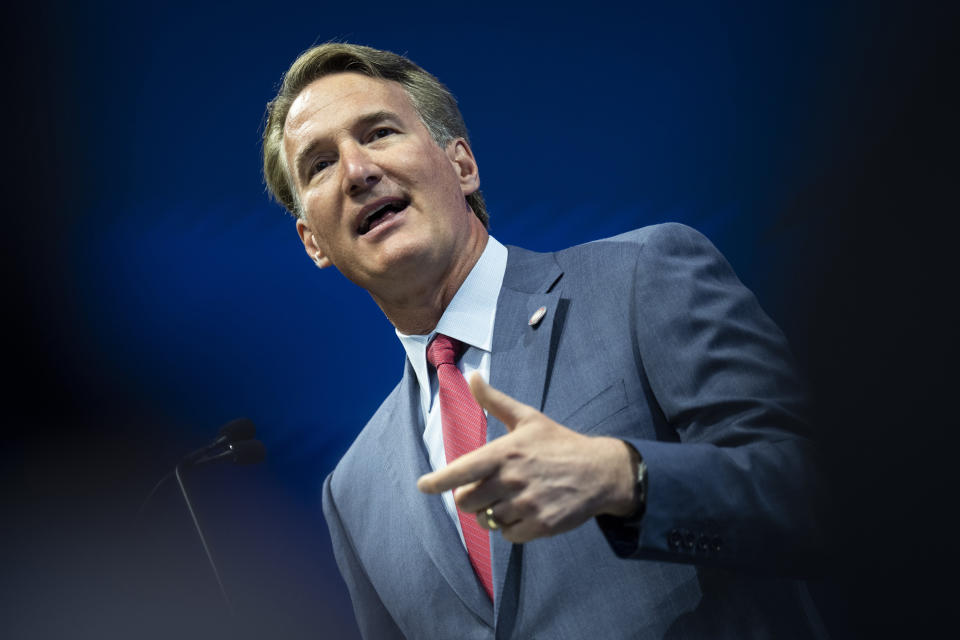It’s likely too late for new hopefuls to jump into the 2024 GOP presidential primaries
- Oops!Something went wrong.Please try again later.
WASHINGTON — Some Republicans are holding out hope that a new candidate — perhaps Virginia Gov. Glenn Youngkin or Georgia Gov. Brian Kemp — will drop into the GOP presidential primary at the last moment and stop former President Donald Trump from winning the party's nomination.
But at this late date, even The Flash would have a tough time beating deadlines to get on the primary ballot in some states, according to Republicans familiar with the mechanics of running for president.
"The runway for someone to realistically run for president is basically over," said Nick Trainer, who served as Delegates and Party Organization director on Trump's 2020 campaign but is not working for a White House hopeful this cycle.

"To get on the ballot in states isn't that hard, but it's time-consuming and can be expensive," Trainer said. "These folks' carriage in their fantasy land is about to turn into a pumpkin."
In other words, the field is all but set, and Republicans who want someone other than Trump know who their choices are now.
Two of the early states, Nevada and South Carolina, have filing deadlines next month, before Virginia's Nov. 7 state legislative elections. That matters because Youngkin has sidestepped questions about a late entry in to the 2024 sweepstakes by saying he is focused on the legislative races.
"I’m not in Iowa at the state fair, I was actually at the Rockingham County fair,” Youngkin said on Fox News Sunday Sept. 10. “I’m campaigning in Virginia for Virginians, not around the country.”
While neither of those states require candidates to submit voter-signed petitions, their deadlines will pass before Youngkin's timetable. And many states do require campaigns to collect signatures, a process that can create a logistical logjam for candidates who must deploy resources to several of them at once.
Two more states, Alabama and Arkansas, have filing deadlines within a week of the Virginia elections, and a flurry of states, including delegate-rich California and Texas, close their windows in December.
For a candidate to appear on the ballot in many of the December-deadline states, he or she would already have to be collecting signatures — and there's no shadow campaign going on right now, according to GOP operatives who are paying close attention to the race.
It would be hard enough for a candidate to get in now and qualify in all of those states, but waiting until November would make the task much harder because it would mean ceding crucial early primary states.
“If you’re just talking about the nuts and bolts on how to launch a presidential campaign, especially after giving up on two of the first four states, especially one like South Carolina that’s so big, how do you run a March-only race and be successful?" said a GOP strategist who is supporting one of the candidates. "It's just never going to happen."
In addition to the ballot-access hurdles, political operatives say, the graveyard of past presidential campaigns is littered with late entrants who lacked the polish of rivals who spent months shaking hands in early states, dealing with the crush of scrutiny from the media and debating opponents.
Mike DuHaime, a former political director at the Republican National Committee and veteran of several presidential campaigns, said that there are many reasons beyond ballot access that make an 11th-hour entry difficult.

"It rarely goes well because running for president is so much harder than anyone thinks," said DuHaime, an adviser to former New Jersey Gov. Chris Christie, who is running for the second time.
"Candidates have been studying policies for months, raising money for months, campaigning in early states for months, going through debates and debate for months," he said. "It is hard to jog into a race when everyone else is already sprinting at a varsity level."
This cycle, he added, has "the added wrinkle" of candidates having to amass 50,000 or more donors for the coming debates.
Prospective candidates would also have to hire ballot-access experts and staff to oversee signature-gathering efforts at a time when top operatives have long since committed to other campaigns.
The most recent candidate to come into the process late after skipping early states — former New York Mayor Michael Bloomberg — fell flat in his first debate, never recovered and dropped out of the 2020 Democratic primary without winning a state. Republicans have seen similar efforts, including those of former Sen. Fred Thompson, who launched his 2008 campaign in September 2007, and former New York Mayor Rudy Giuliani, who skipped the early states in 2008.
"It's not even the complexity, it's the calendar," the GOP strategist said.
This article was originally published on NBCNews.com
